Former naval officer is teaching farmers and students to employ hydroponics for better food security in India
Lt. Commander CV Prakash is on the road to transform India's agricultural sector by conducting training sessions about hydroponics, a soil-less cultivation technique, for thousands of farmers and students.
The average size of cultivable land in India has been shrinking year on year in the recent past. The arable land holding in the country decreased from 1.15 hectares in 2010-11 to 1.08 hectares in 2015-16, according to the tenth agricultural census prepared by the Ministry of Agriculture and Farmers Welfare.
Hence, there is a burgeoning need to turn towards other alternatives to grow crops. Hydroponics is one such solution, as through this approach, plants can be grown just by using minerals, nutrients, and water instead of soil. Despite the multiple benefits hydroponics offers, it is yet to pick up pace in India.
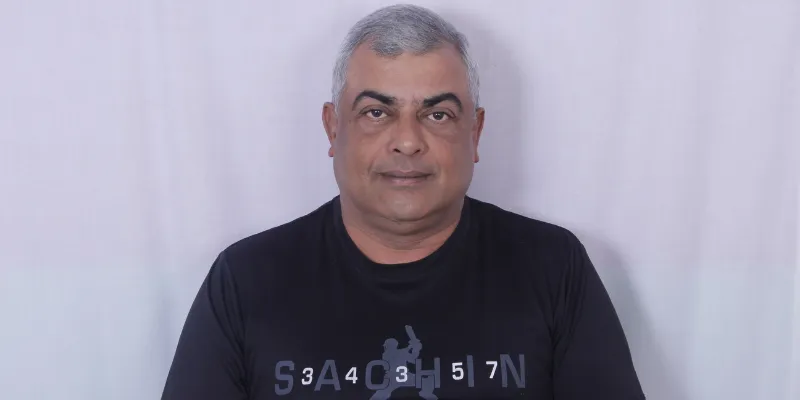
CV Prakash has been training thousands of farmers across India in hydroponics.
Enter Lt. Cdr CV Prakash, a former Naval officer, who is on the road to transform this scenario by spreading awareness and conducting training sessions about hydroponics for farmers and students alike.
In the year 2008, he set up PetBharo Project in the Dharwad district of Karnataka to engage people in soil-less cultivation of fruits, vegetables, herbs, and flowers. Since then, he has taught more than 10,000 students to grow crops under this methodology.
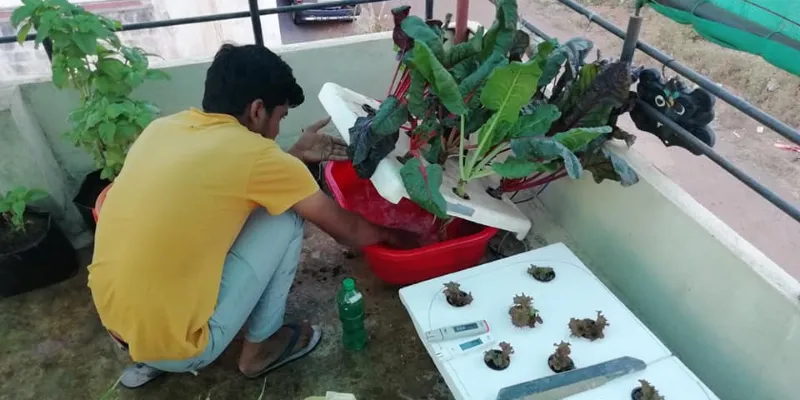
One of CV Prakash's students setting up a hydroponics garden.
“My objective is to feed mankind with nutritious, pesticide-free and affordable food. Since hydroponics holds the potential to fulfill this, I went after it,” Prakash, Farmer-in-Chief of PetBharo told YourStory.
From the navy to the farm
CV Prakash was once a naval officer serving in the submarine arm. Upon taking an early retirement in 1997, the then 35-year-old moved to Dubai where he worked in the avionics space. However, he soon felt the pinch and decided to take up other lucrative jobs like printing and selling T-shirts, trading second hand furniture, and driving a taxi to sustain himself and his family.
After a few months, he went to Australia with a goal to get ahead in his career. With just a laptop and an internet connection, CV Prakash started a consulting company to assist companies based out of India, Australia, and the UAE to carry out transactions among themselves. This was when his tryst with hydroponics began.

A roof top garden cultivated without using soil.
He recollects,
“One day, as part of work, I visited a Sri Lankan company that was importing coco-peat. They had set up two greenhouses full of flowers and vegetables without using a trace of soil. I instantly fell in love with those gardens. From then on, there was no looking back. I learnt the art of soil-less cultivation from some of the best growers and experts."
After practising hydroponics in several farms across Australia and carrying out an immense amount of research in the field for eight years, CV Prakash decided to promote it in India by establishing the PetBharo project.
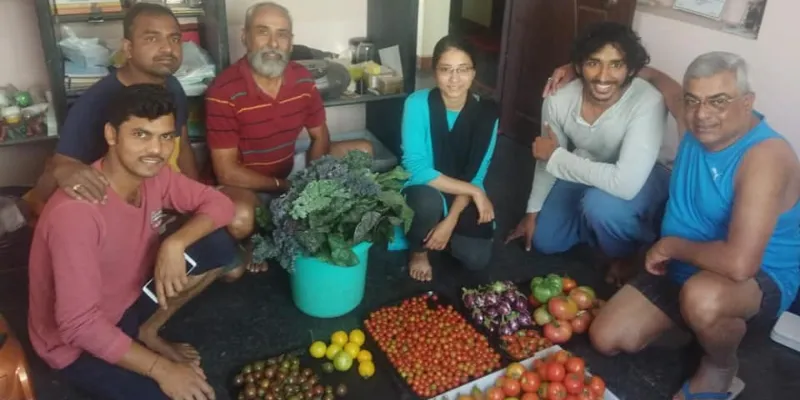
CV Prakash (extreme right) along with students and farmers.
The project is focused on empowering students and farmers to grow crops using minimal resources. As part of this initiative, he has been conducting workshops on a regular basis and also organising a three-month residential course aimed at teaching people to grow more than 40 varieties of crops right from planting the seed to harvesting the produce.
Anil Lalwani, a farmer who owns a company called Mameha Agro, got a better yield from his crops after incorporating the techniques taught by CV Prakash.
He says,
“I attended a few training sessions about hydroponics organised by PetBharo and it gave me a whole new perspective. The methods suggested by CV Prakash was both practical and cost-effective. I tried implementing everything I learnt. Right after, I was able to grow a lot more spinach and bok choy in my farm."
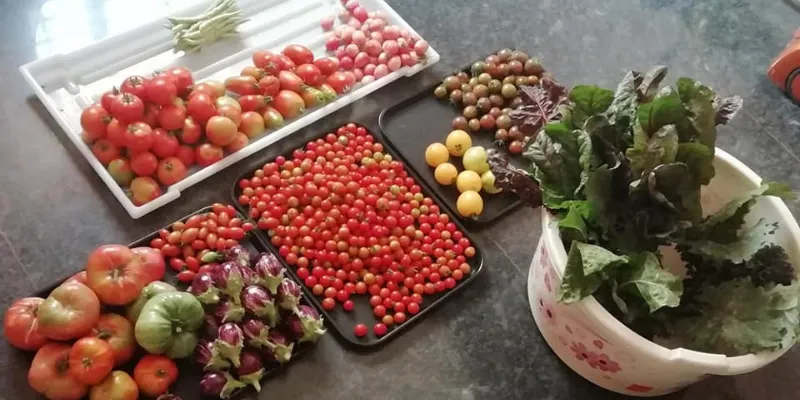
Some produce harvested using the techniques of hydroponics.
At present, CV Prakash is on a mission to travel across 13 cities in India to train farmers, researchers as well as students in the art of soil-less cultivation by putting together 44 workshops.
“A lot of people in this country are suffering from malnutrition due to low agricultural productivity. Farming in itself is turning out to be an unviable occupation. All my efforts are directed towards resolving this agrarian distress using alternative cultivation practices like hydroponics,” notes CV Prakash.
Also read: In Central India, tribals are tapping technology and innovating to become lakhpati farmers
The realm of hydroponics
Hydroponics, a method of growing plants without soil is known to be suitable for commercial food producers, farmers, and hobbyists. All that is needed to set up a garden is an open space with a good source of light and certain minerals dissolved in water along with some basic landscaping equipment.

Tomatoes plants grown using hydroponics.
“For people who want to grow using this technique, there is a hydroponic kit available in the market consisting of all the required tools like coco peat, a container filled with healthy microbes, nutrients in the form of a spray, a grow bag for the crop to fit in as well as sticky traps to nab insects and pests. And, all of this involves a one-time cost of Rs 22,000,” says CV Prakash.
Several varieties of fruits and vegetables can be produced using this technique, right from tomatoes, beans and capsicum, to strawberries, spinach, and coriander.
Hydroponics is known to be faster, cleaner, and a more effective way of growing plants compared to traditional cultivation methods. Since all the produce is grown using natural methods after eliminating the use of pesticides and without having to worry to about soil contamination, the yield derived from is more.
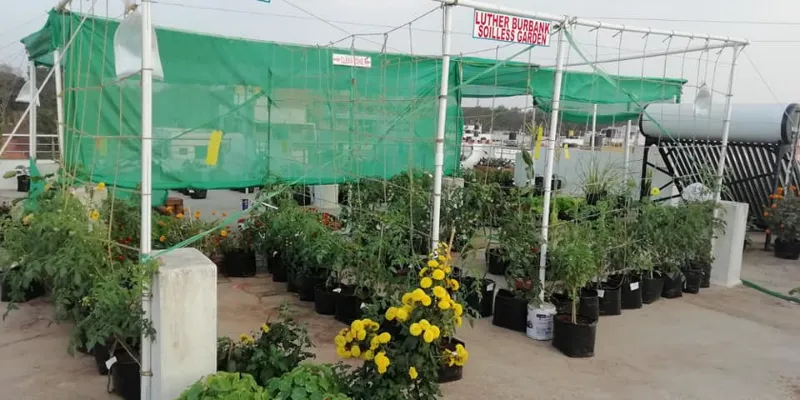
A hydroponics garden planted on the terrace.
He says,
“At a time when agriculture in India is being knocked down by climate change including unseasonal rain and hail storms, hydroponics allows for growing plants under controlled conditions. It is economically viable and people can obtain fresh produce through the year. But for the country to be able to embrace hydroponics, there needs to be a policy framework and an incentivising scheme in place."
The success story thus far
CV Prakash has never missed an opportunity to spread awareness about soil-less and pesticide-free cultivation. He has the unique distinction of setting up a 3,500 sqft live hydroponics pavilion at the Agri-Intex exhibition, Coimbatore in 2014. This event drew thousands of people from across the country.
Another noteworthy idea he executed is the creation of food parks in the semi-urban limits of large cities, using techniques based on hydroponics. His goal was to ensure people lead a self-sustaining life and consume only clean, green, pesticide-free, fresh vegetables and fruits.
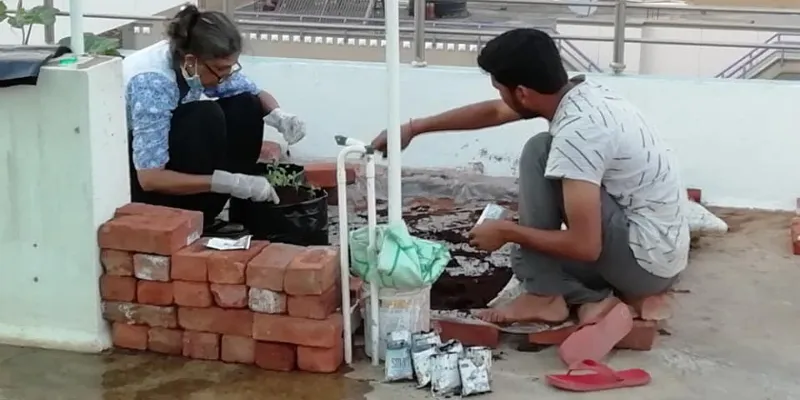
CV Prakash's students planting a few crops.
Besides these, he has a lot of other accomplishments to his name. He has trained people from diverse backgrounds in hydroponics.
“When I visited the Bandhavgarh National Park in Madhya Pradesh, I got a chance to teach some of the tribal groups to grow their own food and attain self-sustainability. I also trained the staff of a healthcare centre called Sathya Sai Super Specialty Hospital in Bengaluru, after which they started their own rooftop garden. Today, all the patients at the hospital get to eat fresh produce on a daily basis,” CV Prakash says.
He has even taught children at orphanages and the elderly at shelter homes to grow vegetables and fruits in their backyard.
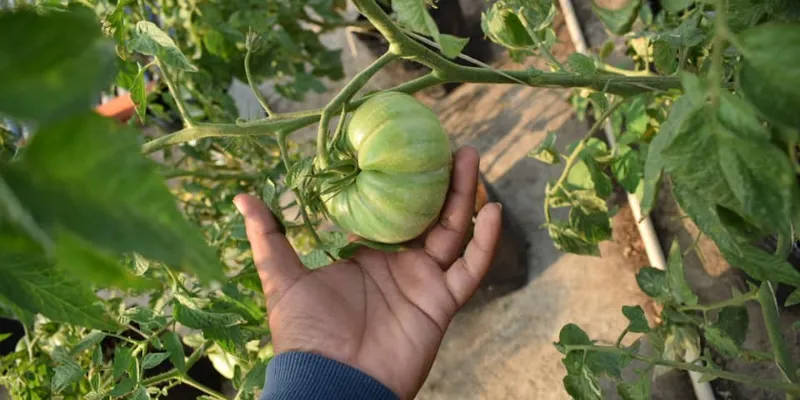
Vegetables being harvested from a hydroponics garden.
In 2016, he was honoured with the Jai Jawan Jai Kisan award for his efforts in the field of horticulture by the University of Agricultural Sciences at Dharwad.
With agricultural land shrinking every year and with farmers heavily relying on rainfall for a good harvest, CV Prakash’s efforts in the hydroponics space seem to be laying the road for a sustainable future.






